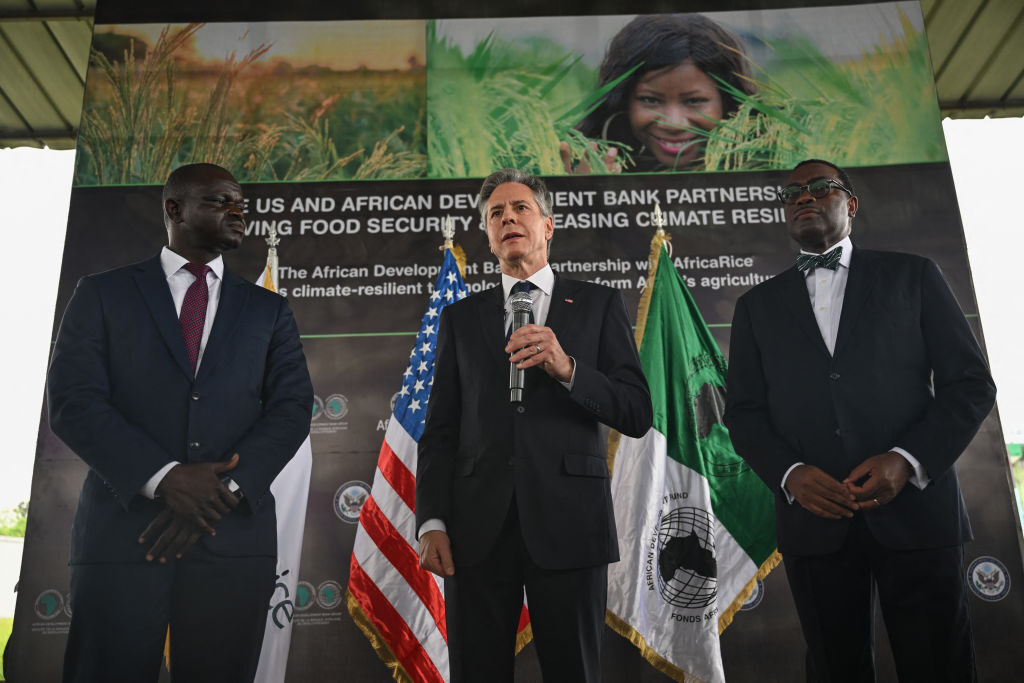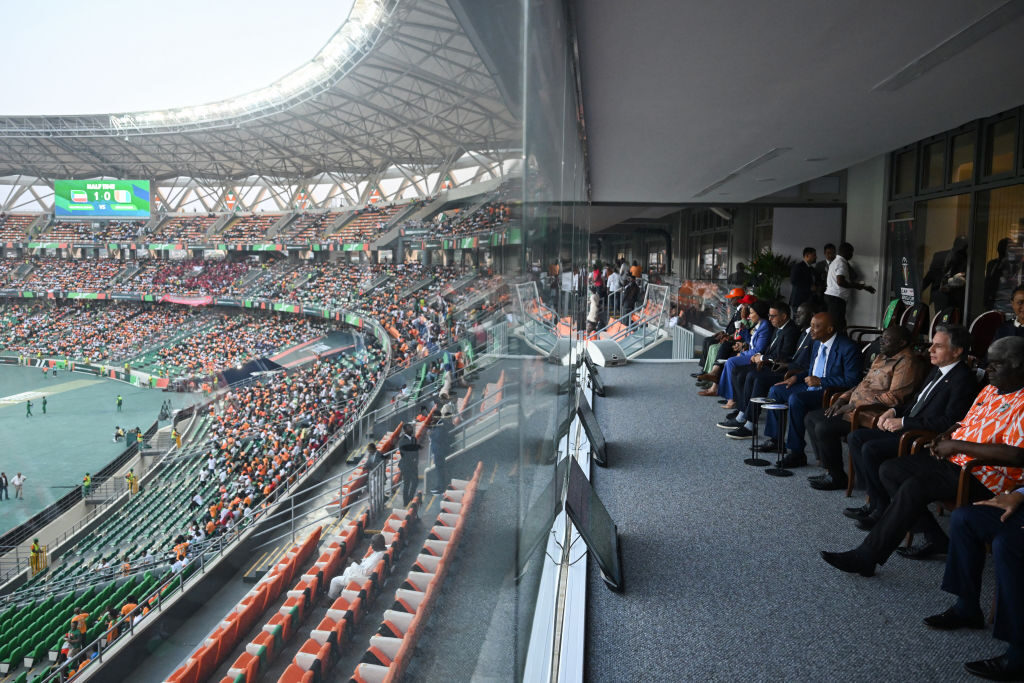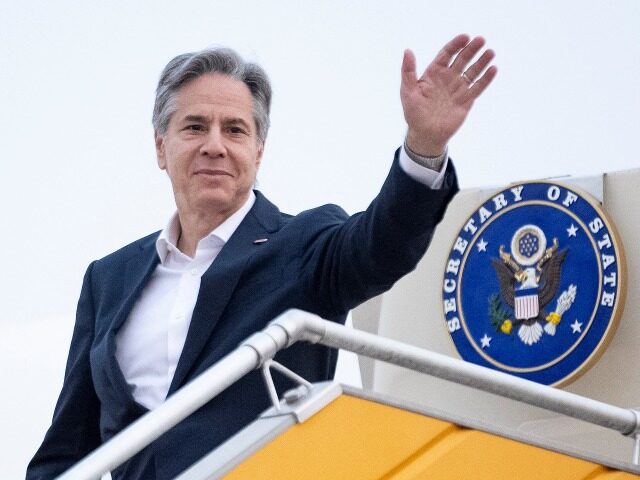Secretary of State Antony Blinken began a visit to Africa on Sunday that will take him to Cabo Verde, Cote d’Ivoire, Nigeria, and Angola, mere days after Chinese Foreign Minister Wang Yi concluded his own tour of the continent.
The Chinese Communist Party has prioritized Africa’s impoverished countries as potential prey for its Belt and Road Initiative (BRI), a global infrastructure debt trap program in which it offers predatory loans that allow Beijing to influence the nations’ politics and economy. The BRI has experienced a modest decline in popularity in the past year as payments came due and the world witnessed volatile countries such as Sri Lanka struggling to keep China from seizing its territory.
China has begun its annual diplomatic itinerary with a top-level visit to Africa every year for the last 34 years, emphasizing its interest in colonizing Africa’s vast natural resources, particularly minerals necessary for the development of electric vehicle batteries and other “green” technology. While African journalists have complained that the Chinese government have made workers “slaves in their country,” corrupt local governments have embraced China’s presence and investments in infrastructure projects.
Leftist President Joe Biden has attempted to counter Chinese influence in the region by indulging poor leadership on the continent, such as refusing to add Nigeria to the State Department’s annual list of “Countries of Particular Concern” (CPC) for religious freedom despite it being ranked the world’s most dangerous place to be a Christian. Biden has also confused and alienated African countries with bizarre attempts to connect, such as comments during an African leader summit in 2022 in which he complained that “poor relatives” “come and they eat your food, stay longer than they should.”

U.S. Secretary of State Antony Blinken (C) and President of the African Development Bank Group Akinwumi Adesina (R) deliver remarks following their meeting at the AfricaRice Headquarters in Abidjan on January 23, 2024. (ANDREW CABALLERO-REYNOLDS/POOL/AFP via Getty Images)
Biden’s tactics have largely failed as China continues to expand its geopolitical and economic influence on the continent.
All four nations Blinken is scheduled to visit are members of the BRI.
According to the State Department, Blinken will emphasize “respect for human rights, promotion of democracy, and expansion of the rule of law” in his talks with African leaders. In an apparent nod to the BRI, he will also explain “how the United States is investing in infrastructure in Africa” and is a worthy partner to “help Africa compete in the global marketplace.”
Blinken made a brief stop in Cabo Verde on Monday before heading to Cote d’Ivoire, where he will be on Tuesday.
In Cabo Verde, Blinken emphasized the significant American investment that the country used to upgrade the port in its capital, Praia. Ports, roads, and railways are the most common projects China has taken on as part of the BRI.
“The United States was able to invest significantly in modernizing and upgrading this port so that its capacity was dramatically expanded in terms of the number of ships that it could bring in,” Blinken said in Praia, “the efficiency of the port also dramatically increased so that ships could be processed much more quickly, the storage capacity around the port also built up.”
The prime minister of Cabo Verde, Ulisses Correia e Silva, used his remarks alongside Blinken to tout talking points of interest to Biden, including condemning the faraway Russian invasion of Ukraine and promoting the creation of a state of “Palestine,” a common talking point of the jihadist terror group Hamas and a priority issue Blinken has personally elevated in the past week. Correia tellingly used Chinese Communist Party terminology even in describing his relationship with Washington, however, thanking Biden for his alleged “genuine interest in win-win partnerships with Africa.” Beijing often uses the term “win-win” to describe situations in which China takes advantage of weaker partners.
Wang Yi, the Chinese Foreign Minister, visited Africa from January 13 to 18, beating Blinken there by a week. The only overlap in their itinerary is Cote d’Ivoire; Wang chose Egypt, Tunisia, and Togo as his other stops, emphasizing China’s support for the pro-Hamas agenda of Muslim-majority nations on the continent. Wang’s visit was the 34th time that a Chinese top diplomat chose Africa for his first foreign trip of the year.
Wang emphasized the Belt and Road Initiative in his conversations in Africa, according to the Chinese state-run Global Times newspaper.

U..S Secretary of State Antony Blinken (2nd R), Prime Minister of Ivory Coast Robert Beugre Mambe (R) and President of the Confederation of African Football (CAF) Patrice Motsepe (4th R) watch the Africa Cup of Nations (CAN) 2024 group A football match between Equatorial Guinea and Ivory Coast at the Alassane Ouattara Stadium in Ebimpe, Abidjan on January 22, 2024. (ANDREW CABALLERO-REYNOLDS/POOL/AFP via Getty Images)
“China will always stand firmly with Africa, support Africa in accelerating its independent development, and promote the upgrading of China-Africa cooperation,” Wang said in Togo. “As long as Africa is united and independent, grows stronger through unity, and is seeking out a development path suited to local conditions, the continent will be able to overcome difficulties and create new opportunities.”
The Chinese Foreign Ministry, in its regular briefing to reporters on Friday, said Wang’s stops in Africa were intended to show “the importance attached by China to Africa and China’s firm support for Africa’s development and revitalization” and that Beijing would continue to attempt to expand the BRI.
“China will work with Africa to promote the synergy between high-quality Belt and Road cooperation, the Global Development Initiative, the Global Security Initiative and the Global Civilization Initiative,” spokeswoman Mao Ning said, referring to various vague programs launched by dictator Xi Jinping.
“We will deepen exchanges on experience of governance, advance cooperation initiatives in line with the development needs of China and Africa in the new era, and lend strong impetus to a high-level China-Africa community with a shared future,” Mao promised.

COMMENTS
Please let us know if you're having issues with commenting.